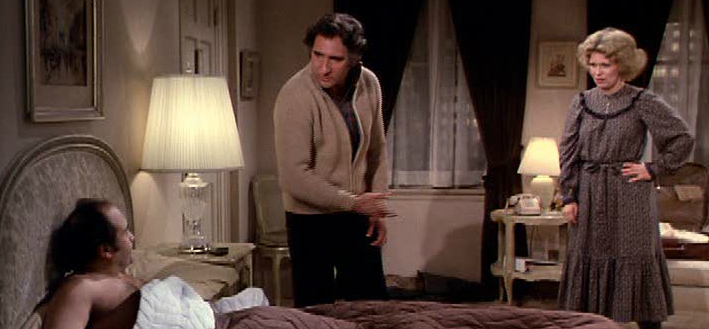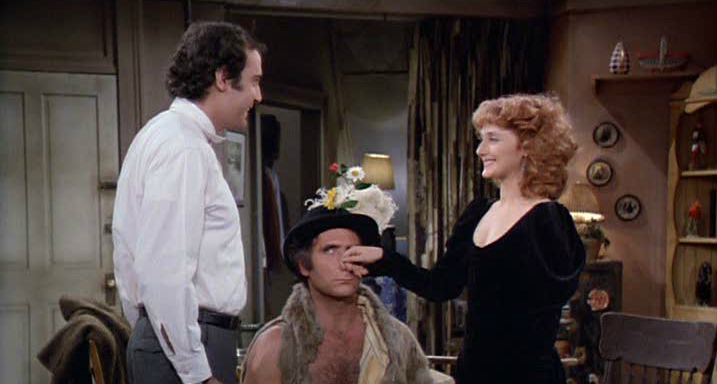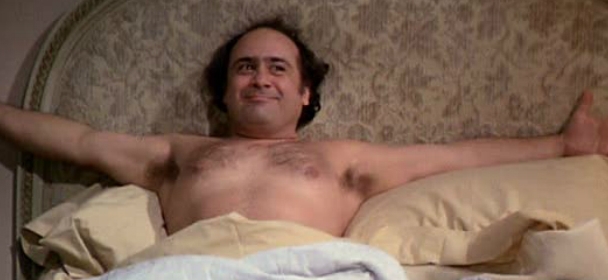Season 4, Episode 17: “Take My Ex-Wife Please”
Original airdate: Feb. 18, 1982
Summary: Alex’s ex-wife, dumped by her second husband, rebounds by dating the most unsuitable person imaginable: Louie.
Reesav: We’ve made quite a leap forward, jumping a whole season and then some, to land in the show’s final season on ABC (with Taxi moving to its fifth and final season on NBC).
During this time, Louie and Zena have broken up (which is quite sad), and now Louie has returned to his womanizing ways, pursuing Alex’s ex-wife, Phyllis (portrayed by Louise Lasser of Mary Hartman, Mary Hartman fame). Phyllis, in turn, is trying to reconcile with Alex.
“Take My Ex-Wife Please” strikes me as a somewhat peculiar episode. I appreciate that it avoids the temptation to return to (or even linger at) the restaurant where Banta, Alex, and Jim encounter Randi and Candi (I can hardly believe those were the actresses’ actual names), which would have been the easy route to humor.
Even turning it into a B-plot of some sort would have provided some quick laughs as Jim endeavors to appear debonair in front of the twins, much to Banta’s exasperation.
However, I don’t find the premise of Louie attempting to seduce Phyllis particularly humorous. It’s executed remarkably well by both Danny DeVito and Lasser, with the latter delivering her lines with sly wit and skillfully playing on word misunderstandings for maximum comedic effect.
Yet, I miss the sense of melancholy that has characterized Taxi in previous episodes. In this one, it feels a bit more like just another sitcom, even if it is executed with artistic finesse.
Nirajan: I must confess, I had some reservations about leaping forward from early season two to the tail end of season four, but I think this transition turned out to be quite insightful.

While our time with Taxi over the past seven weeks has been limited, I feel like we have a good grasp of these characters, so it’s enjoyable to see them two-plus years ahead of where we were just last week.
One might expect a comedy to become louder, broader, and more generic two years down the road, and truthfully, I see hints of that in both of these episodes. Centering an episode around Louie, particularly his pursuit of a woman, tends to bring out the zanier side of the show, and like Reesav, I found the execution of that pursuit a bit tiresome here.
Louie following Phyllis around in the shop had its charm, but once he (and Alex) arrived at her place, the serendipity wasn’t particularly appealing, nor were the jokes.
However, there were moments in these episodes that felt like natural progressions of the characters and scenes we witnessed in the first two seasons. I particularly enjoyed Alex’s initial encounter with Phyllis at the restaurant.
It was a humorous yet mostly straightforward character moment that reaffirmed how much Alex cares about people, even if those people include his ex-wife. The episode continues to emphasize this point as things unfold, although with less success.
On a side note, I must admit that I missed having Jeff Conaway’s Bobby around. Even if he had been present, it’s not like he would have played a significant role in this episode. Nonetheless, it felt odd to see a shop sequence without Bobby chuckling in the background.
Sidant: Describing this episode as an odd duck is one way to put it, Reesav. Personally, I’d go a step further and call it a dud.
I’m not certain if it’s because there have been 57 episodes since the excellent ones we last watched, causing the show to lose its vigor in the meantime, or the fact that aside from Louie and Alex, it barely involves the show’s ensemble.
It might also be the lack of context for Alex and Phyllis beyond the phone call in the pilot, but it undeniably feels much weaker compared to what we’ve seen before.
Also Read: Roundtable Review: Taxi, “Reverend Jim: A Space Odyssey” and “Nardo Loses Her Marbles”
The reason for this, in my view, ties back to something I discussed in earlier segments: pacing. There are scenes here that only last a minute or two like the expositional interaction between Tony and Alex, and even the longer scenes come across as relatively abrupt.
None of the scenes exhibit that same sense of deliberate pacing that I had started associating with Taxi, and it gives off a more generic sitcom vibe.
In previous episodes, we’d spend a third of the time at the restaurant, another third at the garage, and the final third at the hotel. Here, it feels like scenes are being thrown in just to keep the action moving.
While it’s certainly interesting to witness a show evolving from one place to another, it leaves me feeling a bit disheartened, much like what one might expect from Taxi.
Having said that, I still believe the show hasn’t entirely lost its edge and continues to draw its fair share of humor from Louie’s seduction.
I found it more enjoyable than it seemed to Nirajan or Reesav, mainly because I continue to be amazed by the extent to which Danny DeVito fully embraces the depravity of his characters (“I know where there are girls who just failed their bar exam!”).
The unbridled delight he takes in the triumphant “Bingo!” when Phyllis agrees to date him, his swift leap into bed, and his immediate blame-shifting at Alex—all of this showcases his demented, unapologetic gremlin-like character.
Roshan: The clash between Alex and Louie typically serves as a strong foundation for a Taxi episode, but like the rest of you, I found this one somewhat lackluster.
Louie’s courtship wasn’t as much a display of his charmingly oily nature as it was just plain oily, and Phyllis reversing her decision to go out with him didn’t make much sense beyond the necessity of the script.
She delivers the line of the night when she assesses Louie— “No real person acts like that”—but to be fair, he had been broadcasting his unpleasantness all along.
As you all mentioned, there are noticeable tonal shifts between early season two and late season four, which is a common occurrence when there’s a gap of that length in any series.
It’s somewhat like how you might not notice a gradual change in someone’s appearance when you see them every day, but an old friend you haven’t seen for six months can seem oddly different.
The most striking example of this for me was Jim, whose mania appears to have escalated in tandem with his hair. Both his writing and Christopher Lloyd’s performance felt broader than they did over 50 episodes ago.
I suspect this is a case of the writers recognizing that a particular character’s quirks were especially popular (or enjoyable to write) and incrementally amplifying those quirks, subsequently stripping away some of the subtlety that had grounded them.
This phenomenon, as I’ve coined it elsewhere, is what I like to call “John Dorian Syndrome.”
Season 4, Episode 21: “The Wedding of Latka and Simka”
Original airdate: March 25, 1982
Summary: Latka and Simka announce their engagement, but to get married according to the customs of their country, they have to pass a series of tests of their love.
Reesav: “The Wedding of Latka and Simka” may not be an exceptionally funny episode, despite featuring great guest stars like Dr. Joyce Brothers as herself. However, I appreciate that it primarily serves as a satire of the institution of marriage and the absurdities entailed in the process.
Even before the wedding preparations commence, Latka observes that his culture believes the only things distinguishing humans from animals are superstitions and pointless rituals.
The episode continually plays with this idea, from a comical proposal to a marriage ceremony designed to test love.
It’s rather intriguing that Latka, the foreign man-child, appears to be in the most stable relationship among the cast.
Banta is chasing after twins, Alex remains single, Louie is no longer with Zena, and Jim doesn’t seem to have a romantic partner (no mention is made of Elaine’s relationship status, though she is presumably single).
Maybe it’s because Latka hasn’t been worn down by life and views everything in the country as an opportunity, like an oyster with a pearl. This perspective could explain why Latka has found and married the love of his life.
Nirajan: Reesav, your observations regarding the episode’s satire are absolutely on point. However, I must admit that by the end of the episode, I found myself growing weary of how it continued to ramp up the goofball atmosphere.
Part of my frustration with this episode stems from the fact that we haven’t been introduced to Simka before, or even Latka’s mother, for that matter. Our non-linear viewing schedule has caused us to miss potentially crucial character and relationship developments.
Both Simka and Latka’s mother appear to be fascinating and intriguing characters, and I suspect that this episode was the culmination of a larger narrative. Unfortunately, that’s just a side effect of our viewing sequence.

Nevertheless, I appreciate how this episode differs from “Paper Marriage,” the other instance of Latka getting married.
In the previous episode, he was getting married for entirely different reasons, and I liked how the writers ensured that this one had its own unique identity. Latka is undeniably more invested in this ceremony, and Simka is a much more developed character than the escort from the first season.
In contrast to that earlier episode where other characters manipulated circumstances to keep Latka around, he takes a more active role in this wedding, even though Simka plays a crucial part at the very end.
Sidant: I’ll admit to a bit of cheating here. Before watching this episode, I decided to get a bit more context by viewing season two’s “Guess Who’s Coming For Brefnish” and season four’s “Simka Returns.”
This also revealed to me that Latka undergoes a rather bizarre transformation in season four, which was one of the most bewildering moments I’ve ever witnessed in a sitcom.
You’re absolutely right, Nirajan, that the relationship between Latka and Simka has much more depth to it, which is explored in earlier episodes. “Guess Who’s Coming For Brefnish” was probably one of the most emotionally charged episodes in the show.
Carol Kane’s portrayal of Simka is particularly remarkable, as she manages to match the pace of Andy Kaufman’s indecipherable dialect while conveying the endearing quality of his confusion and fascination with American culture.
Instead of being a mere female replica of Latka, she seamlessly fits into the show’s universe.
Consequently, I enjoyed this episode because it provided a satisfying conclusion to that relationship, even though the relationship faces more challenges until the end of the series, according to the episode guides.
Taxi is a show that often emphasizes that things may not necessarily improve, but we can become better at dealing with them. Most of Latka’s romantic endeavors have fallen into that category, as they were either bungled or driven by necessity.
It’s heartwarming to witness someone at the garage finally achieve a win, and it’s equally heartwarming to see the rest of the garage crew willing to support these crazy kids.
Abishek: It was crucial to include an episode that delved into the relationship between Latka and Simka, although this episode doesn’t provide the best introduction to their relationship, which primarily develops during this season.
Looking back, I highly recommend following Sidant’s wise choice to watch some of those earlier episodes. The Latka-Simka dynamic does more than any other aspect of the series to humanize the gibberish-speaking mechanic and give him depth.
Episodes like “Simka Returns,” which feature Latka’s inexplicable alter-ego Vic Ferrari (a precursor to Stefan Urquelle for you T.G.I.F. fans), are worth exploring.
As you mentioned, Nirajan, the contrast with “Paper Marriage” is as enlightening as last week’s comparison between our two Elaine episodes. Once again, some time has passed, and the main character has grown more self-assured, as has our connection with that character.
What’s strangely wonderful is that this wedding ceremony, officiated by another lanky character-actor guest star, Vincent Schiavelli, takes place on the premises of the Sunshine Cab Company.
Despite the air of semi-acknowledged failure that hangs over the cabbies, for Latka, that garage isn’t where his dreams came to die; it’s where they thrived. It has provided him with a home in America, significant enough to serve as the backdrop for his engagement.
I don’t believe you can attribute this solely to budgetary concerns behind the scenes; if it were just about using an existing set, they could have held the ceremony in his apartment.


